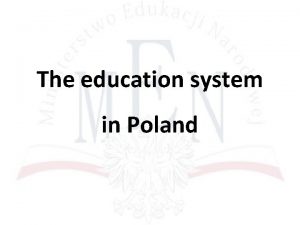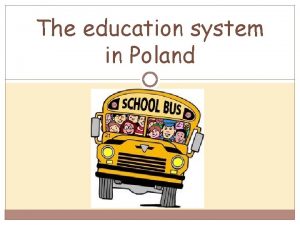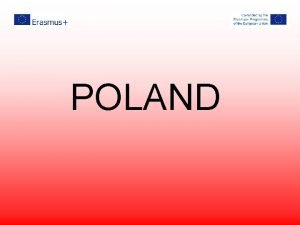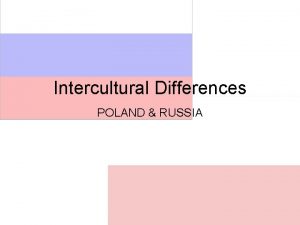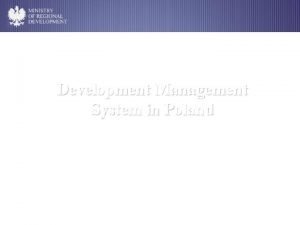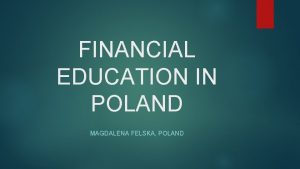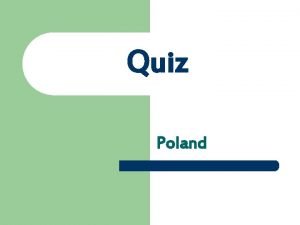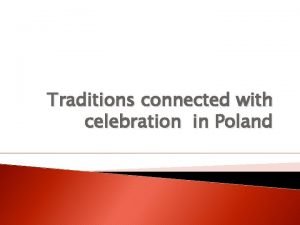Education in Poland The education system in Poland














- Slides: 14

Education in Poland

The education system in Poland is very complicated. It includes public and private kindergartens, primary schools, lower secondary schools, upper secondary schools that consist of high schools, Technical schools, vocational schools and colleges.

What is the school in Poland? Learners have approximately six or seven lesson units a day, five days a week: Monday to Friday and fixed schedule on every day during a semester, because the school year in Poland is divided into two terms. There are two-week winter holidays in January and a twomonth summer holiday in June. Each lesson lasts forty -five minutes, between them there is a ten-minute break. Each class usually counts from 25 to 30 people.

Evaluation system Yearly classification assessments from the educational class, starting with grade IV primary school, are set in grades according to the following scale: perfect - 6, very good - 5, good - 4, satisfactory - 3, acceptable - 2 and 1 - insufficient Behavior: exemplary, very good, correct, inadequate and reprehensible. In Classes I - III, a descriptive classification is compulsory.

Kindergarten Children in Poland can start education at the age of three yet kindergarten is compulsory for every six-year old pupil. They have loose activities, which combine fun with science.

Primary school At the age of seven students get promoted to 1 st grade of primary school. Primary school consists of six classes and is divided into two three-year periods. During the first stage children from seven to ten years old have lessons with one teacher, who is as well their tutor. The activities take place in the form of early school education. At the age of ten students enter the second stage of primary education. At this point, the real acquisition of knowledge begins.

Compulsory subjects that are covered at this level are Polish, foreign language, mathematics, history, music, art, computer science, physical education, religion. By the year 2016 In the sixth grade students took the test of knowledge and skills that were the same for all students, but it didn’t decide which type of junior high school they will attend.

Junior high school The next stage of education for teens between thirteen and sixteen years old is a three-year junior high school. At this level there are new subjects such as: geography, biology, chemistry, physics, education for security.

To complete this level of education students take their final exam, which usually takes place in April. The exam date is the same for all students in Poland. The test consists of three parts: humanities, science and foreign language. The humanities section includes tasks from the Polish language, history and social knowledge. The science section consists of two parts, one contains mathematical tasks and the other tasks from various subjects such as geography, biology, physics, chemistry. The final section is the foreign language exam which covers the basic part and the extended part. Taking the exam is a condition of completing a junior high school. What’s more, the result of the exam is one of the criteria taken into account when recruiting to upper secondary school.

Secondary school After graduating from junior high school, every student can participate in the recruitment to a secondary school, which is the third, non-compulsory level of education in Poland. There are three types of post-gymnasium schools in Poland: 1. Three-year essential vocational schools- A graduate of this school receives only a certificate confirming that he or she has a general education at the vocational level. 2. Three-year general secondary school- A graduate who graduates from this school will have a secondary education and may start postsecondary or higher education. 3. Four-year technical schools- completion of this school allows students to obtain a diploma confirming their professional qualifications, and also a certificate confirming secondary education.

In high school learners choose subjects, which they will pass on Matura Exam(school leaving exam). Accordingly, they are assigned to appropriate classes. In the first grade students have all the subjects, but in the second and third they learn only extended subjects. At the end of the third grade, students write Matura Exam. In technical school students also have vocational subjects in addition to standard subjects. They also have practical subject preparing to their future profession. Vocational school a school providing curriculum for general and vocational education.

College The higher education system in Poland provides education at three levels: * first-cycle studies (bachelor's or engineering studies) * second-cycle studies (supplementary MA) * third degree studies (doctoral studies). To the first cycle studies can apply only those who graduated from high school. Undergraduate studies last 3 years (6 semesters), engineering studies last 3. 5 years (7 semesters). Second-level studies (supplementary master's degree) may be applied by persons holding a first-degree diploma. Secondary studies complement the Master's course of 2 years (4 semesters) or 1. 5 years (3 semesters) and finish with a Master's degree. To undertake a third degree (Ph. D. ) is granted by thr's degree master. Ph. D. studies last for 4 years (8 semesters) and end with obtaining a Ph. D degree.

Academic year in Poland The academic year starts in Poland on the 1 st of October of the given year and ends on 30 September of the following year. The academic year is divided into 2 semesters - winter and summer. Each of them ends with an exam session.

The presentation was done by: Julia Skubis i Anna Bednarz
 Education system in poland
Education system in poland Education system in poland presentation
Education system in poland presentation Hình ảnh bộ gõ cơ thể búng tay
Hình ảnh bộ gõ cơ thể búng tay Lp html
Lp html Bổ thể
Bổ thể Tỉ lệ cơ thể trẻ em
Tỉ lệ cơ thể trẻ em Voi kéo gỗ như thế nào
Voi kéo gỗ như thế nào Tư thế worm breton
Tư thế worm breton Chúa yêu trần thế
Chúa yêu trần thế Các môn thể thao bắt đầu bằng tiếng nhảy
Các môn thể thao bắt đầu bằng tiếng nhảy Thế nào là hệ số cao nhất
Thế nào là hệ số cao nhất Các châu lục và đại dương trên thế giới
Các châu lục và đại dương trên thế giới Công thức tính thế năng
Công thức tính thế năng Trời xanh đây là của chúng ta thể thơ
Trời xanh đây là của chúng ta thể thơ Cách giải mật thư tọa độ
Cách giải mật thư tọa độ
